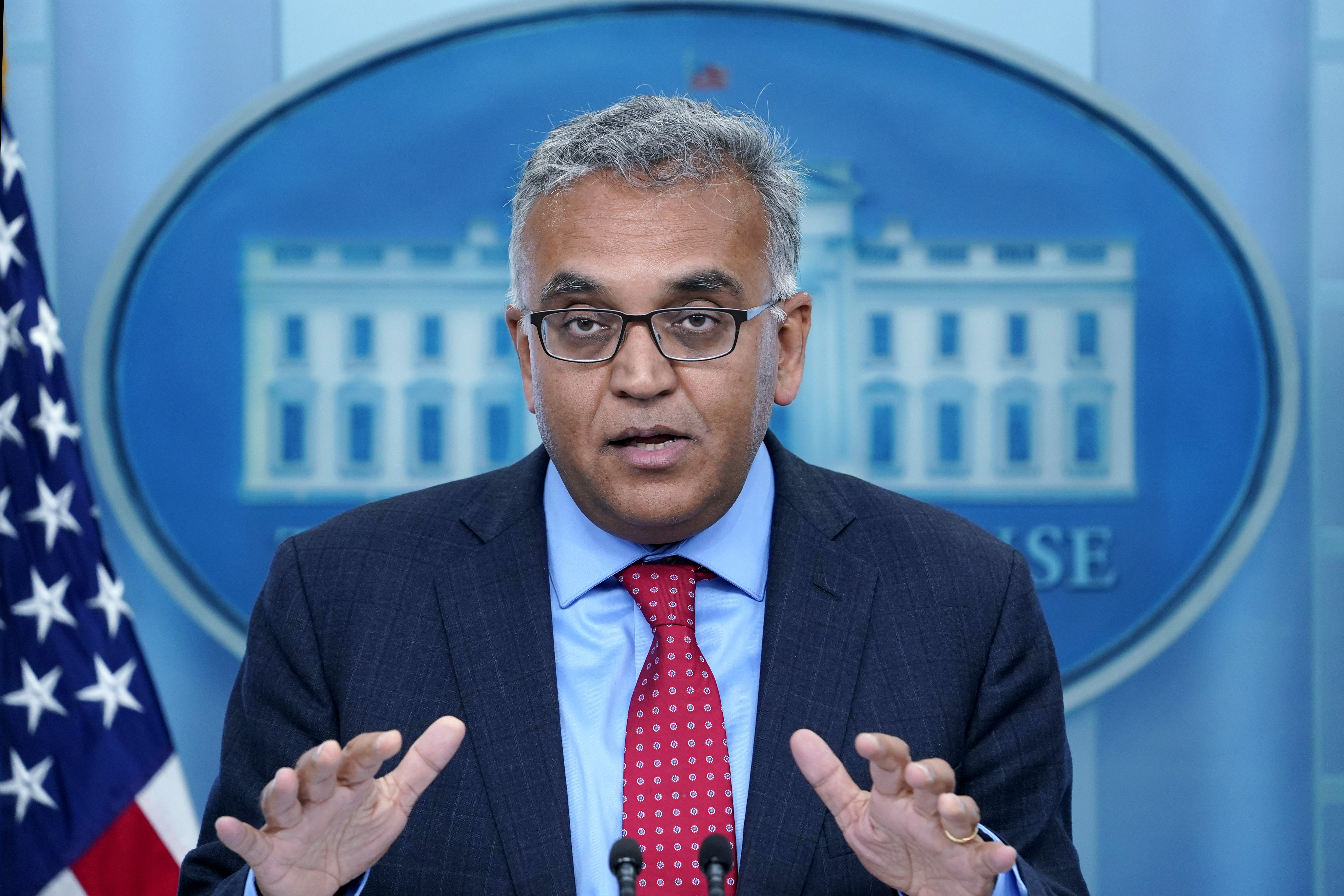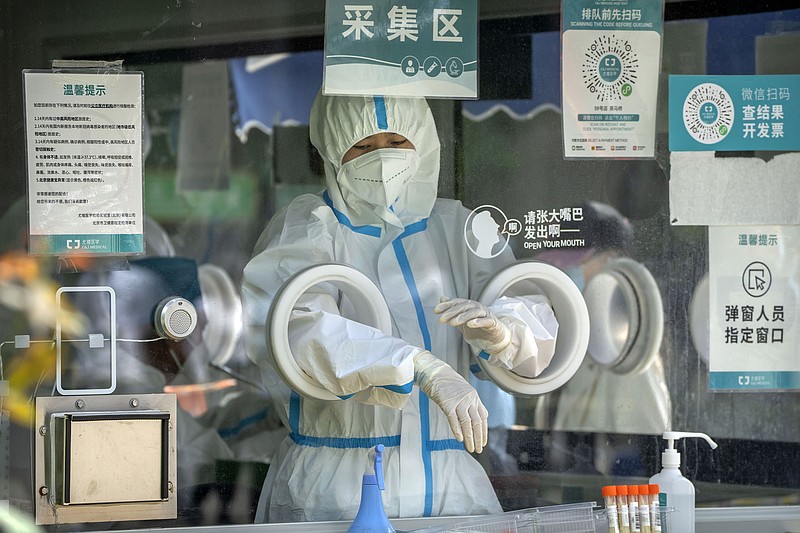WASHINGTON -- Covid-19 cases are increasing in the United States -- and could get even worse over the coming months, federal health officials warned Wednesday in urging areas hardest hit to consider reissuing calls for indoor masking.
Increasing numbers of covid-19 infections and hospitalizations are putting more of the country under guidelines issued by the U.S. Centers for Disease Control and Prevention that call for masking and other infection precautions.
Right now, about a third of the U.S. population lives in areas that are considered at higher risk -- mostly in the Northeast and Midwest. Those are areas where people should already be considering wearing masks indoors -- but Americans elsewhere should also take notice, officials said.
"Prior increases of infections, in different waves of infection, have demonstrated that this travels across the country," said Dr. Rochelle Walensky, the CDC director, said at a White House briefing with reporters.
For an increasing number of areas, "we urge local leaders to encourage use of prevention strategies like masks in public indoor settings and increasing access to testing and treatment," she said.
However, officials were cautious about making concrete predictions, saying how much worse the pandemic gets will depend on several factors, including to what degree previous infections will protect against new variants.
Last week, White House covid-19 coordinator Dr. Ashish Jha warned in an interview with The Associated Press the U.S. will be increasingly vulnerable to the coronavirus this fall and winter if Congress doesn't swiftly approve new funding for more vaccines and treatments.
Jha warned that congressional failure to find additional funding to fight the virus would cause "unnecessary loss of life" in the fall and winter, when the U.S. runs out of treatments.
He added the U.S. was already falling behind other nations in securing supplies of the next generation of covid-19 vaccines and said that the domestic manufacturing base of at-home tests is already drying up as demand drops off.
Jha said domestic test manufacturers have started shutting lines and laying off workers, and in the coming weeks will begin to sell off equipment and prepare to exit the business of producing tests entirely unless the U.S. government has money to purchase more tests, as it did earlier this year.
That would leave the U.S. reliant on other countries for testing supplies, risking shortages during a surge, Jha warned. About 8.5 million households placed orders for the latest tranche of 8 free tests since ordering opened on Monday, Jha added.
The pandemic is now 2½ years old, and the U.S. has seen -- depending on how they're counted -- five waves of covid-19, with the later surges driven by mutated versions of the coronavirus.
The fifth wave occurred mainly in December and January, caused by the omicron variant that spread much more easily than earlier versions.
Some experts are worried the country now is seeing signs of a sixth wave, driven by an omicron subvariant. On Wednesday, Walensky noted a steady increase in covid-19 cases over the past five weeks, including a 26% increase nationally last week.
Hospitalizations also are rising, up 19% in the past week, though they remain much lower than during the omicron wave, she said.
In late February, as that wave was ebbing, the CDC released a new set of measures for communities where covid-19 was easing its grip, with less of a focus on positive test results and more on what's happening at hospitals.
Walensky said more than 32% of U.S. residents currently live in an area with medium or high covid-19 community levels, including more than 9% in the highest level, where the CDC recommends that masks and other mitigation efforts be used.
In the past several days, an additional 8% of Americans were living in a county in medium or high covid-19 community levels.
Officials said they are concerned that waning immunity and relaxed mitigation measures across the country may contribute to a continued rise in infections and illnesses across the country. They encouraged people -- particularly older adults -- to get boosters.
Some health experts say the government should be taking clearer and bolder steps.
The CDC community level guidelines are confusing to the public, and don't give a clear picture of how much virus transmission is occurring in a community, said Dr. Lakshmi Ganapathi, an infectious diseases specialist at Harvard University.
When the government officials make recommendations but do not set rules, "it ultimately rests on every single individual picking and choosing the public health that works for them. But that's not what is effective. If you're talking about stemming hospitalizations and even deaths, all of these interventions work better when people do it collectively," she said.
TRAVEL RECOMMENDATIONS
The CDC is also recommending that summer travelers test for covid-19 in the days before flying.
The agency's recommendation for all travelers regardless of vaccination status came in an update to its covid-19 testing website Monday.
"Consider getting tested as close to the time of departure as possible (no more than 3 days) before your trip" when heading to any destination, the CDC said.
Before the update, the CDC's recommendation did not include domestic travelers up-to-date on their vaccines, according to CNN.
The agency still recommends wearing masks when using public transportation, but doing so is no longer enforced as of April 18.
Here's what travelers should know ahead of the "busy summer travel season," which begins in late May and lasts for three months, according to the Transportation Security Administration.
"Check your destination's covid-19 situation before traveling," the agency says on its domestic travel website.
Covid-19 transmission rates throughout the country can be checked on the CDC's covid-19 Community Level interactive map, which displays infections by counties.
"If traveling to an area with high or medium covid-19 Community Levels, and you are, live with, or are visiting someone with a weakened immune system or at increased risk for severe disease, plan to take steps to prevent getting sick," the CDC advises.
Additionally, the CDC is reminding domestic travelers that "state, tribal, local, and territorial governments may have travel restrictions in place."
Before returning home after traveling within the U.S., the CDC advises to get tested "if your trip involved situations with greater risk of exposure" to covid-19.
For people flying outside of the U.S., covid-19 requirements can differ by country, and the CDC recommends becoming familiar with particular destinations' rules.
"Countries may have their own entry and exit requirements," the agency said on its international travel website.
When returning to the U.S., travelers 2 years and older are required to show proof of a negative covid-19 test or "documentation of recovery from covid-19 in the past 90 days," according to the agency.
The covid-19 test must be completed "no more than 1 day before travel."
For international travelers not considered up-to-date on vaccines, the CDC recommends quarantining for five days after getting home.
HIGH-LEVEL INFECTIONS
Xavier Becerra, the secretary of health and human services, tested positive for the coronavirus Wednesday, his department said, hours after the White House announced that Ashley Biden, the daughter of President Joe Biden and first lady Jill Biden, had tested positive.
Neither is considered a close contact to the president, according to the administration. A close contact is someone who has been less than 6 feet away from an infected person for at least 15 minutes over a 24-hour period, according to the Centers for Disease Control and Prevention's guidelines.
Ashley Biden, 40, was scheduled to travel with Jill Biden to Ecuador on Wednesday afternoon but will no longer make the trip with her mother. Earlier this month, Ashley Biden was to accompany Jill Biden on her trip to Eastern Europe to visit Ukrainian refugees, but on the night of the trip, the White House said that Ashley Biden had been in close contact with someone who tested positive for the coronavirus and would stay behind.
White House press secretary Karine Jean-Pierre said Wednesday that the president had not seen his daughter in "several days."
Becerra tested positive for the virus Wednesday morning in Berlin, where he was to participate in meetings for health ministers from the Group of 7 leading industrial nations, Sarah Lovenheim, assistant secretary for public affairs at the Department of Health and Human Services, said in a statement.
Becerra is fully vaccinated and boosted and is experiencing mild symptoms, the statement said. He will continue to work in isolation.
Becerra was last at the White House on May 12 and is not considered a close contact to the president, according to Lovenheim. The White House requires masks and social distancing when officials meet with the president.
Ashley Biden and Becerra are among a handful of prominent people in the president's orbit who have recently tested positive for the coronavirus, renewing concern about Joe Biden's potential exposure, although none have been considered close contacts. Susan Rice, the White House domestic policy adviser, tested positive earlier this month.
Information for this article was contributed by Zeke Miller and Mike Stobbe of The Associated Press, Julia Marnin of McClatchy Washington Bureau (TNS) and Isabella Grullón Paz of The New York Times.
 White House Covid-19 Response Coordinator Dr. Ashish Jha speaks during the daily briefing at the White House in Washington, April 26, 2022. Speaking to the Associated Press, Jha said Americans' immune protection from the virus is waning and the virus is adapting to be more contagious, and that booster doses for most people will be necessary — with the potential for enhanced protection from a new generation of shots. (AP Photo/Susan Walsh, file)
White House Covid-19 Response Coordinator Dr. Ashish Jha speaks during the daily briefing at the White House in Washington, April 26, 2022. Speaking to the Associated Press, Jha said Americans' immune protection from the virus is waning and the virus is adapting to be more contagious, and that booster doses for most people will be necessary — with the potential for enhanced protection from a new generation of shots. (AP Photo/Susan Walsh, file)